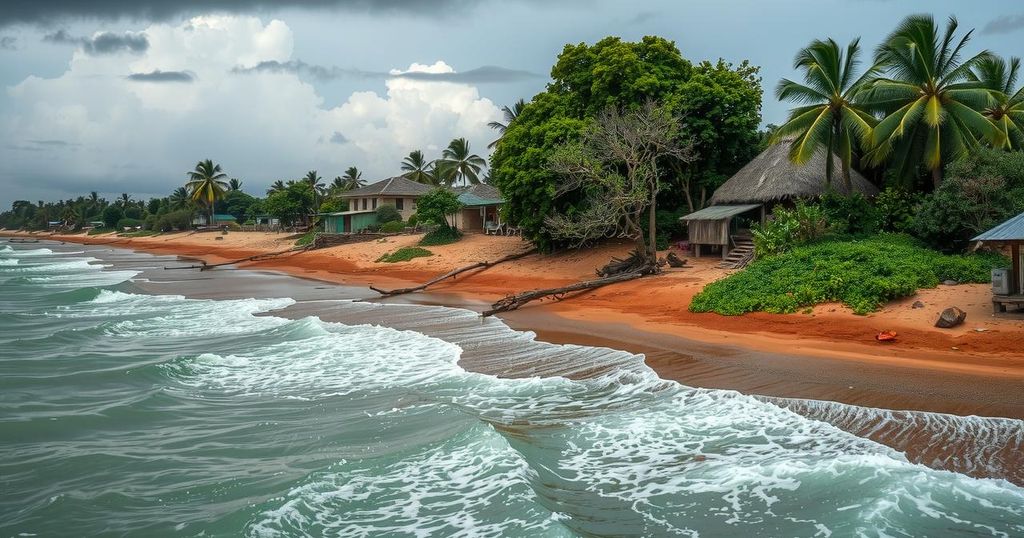Mozambique and Malawi Face Intensifying Climate Challenges from Cyclone Chido

Cyclone Chido has devastated northern Mozambique and Malawi, displacing thousands and causing significant infrastructure damage. The cyclone’s impact highlights the increasing frequency of severe weather in Southern Africa linked to climate change, prompting concerns over food security and public health. While humanitarian efforts are mobilizing, experts call for greater resilience-building measures and international support to prepare for future disasters.
Cyclone Chido has inflicted severe damage across northern Mozambique and parts of Malawi, following its landfall on December 15. The cyclone, which struck after wreaking havoc on Mayotte, has displaced thousands in Mozambique’s Cabo Delgado and Nampula regions. Southern Africa, notably Mozambique and Malawi, has increasingly faced powerful storms like Cyclone Freddy (2023), Gombe (2022), and Idai (2019), raising alarms about the heightened frequency and intensity of severe weather events attributable to climate change.
The devastation caused by Cyclone Chido, with winds reaching 260 km/h and significant rainfall of over 250 millimeters within 24 hours, has left considerable infrastructure damage and loss of life, including reports of fatalities in Pemba and Nampula. Humanitarian organizations have mobilized to provide immediate assistance, but the urgency of their response underscores the need for substantial support as communities grapple with the repercussions of the cyclone. Guy Taylor, a UNICEF representative in Mozambique, expressed concerns regarding the immediate and long-term impacts on children’s education and public health due to the cyclone’s aftermath.
As efforts to assess damages continue, discussions about food security have emerged, particularly as both Mozambique and Malawi strive to recover from previous cyclones. The intensified storm activity in the region, linked to rising Indian Ocean temperatures—according to Lucy Mtilatila, Director of Climate Change and Meteorological Services in Malawi—has made effective preparedness essential.
Malawi exhibited enhanced readiness for Cyclone Chido, with improved coordination across sectors that established emergency protocols beforehand. This proactive approach reflects learned lessons from prior cyclones, including Idai and Freddy, yet emphasizes the ongoing challenges communities face towards resilience. Mtilatila advocates for a comprehensive strategy focusing on relocating vulnerable populations, enhancing infrastructure resilience, and adapting agricultural practices for long-term sustainability.
As assistance from international organizations like UNICEF and the UN World Food Program is urgently required, the regional governments must prioritize resilience building. Experts stress the importance of addressing root causes of climate change while reinforcing local communities to withstand future hazards. Mtilatila underlined the importance of improvement in disaster response, stating that learning from current challenges is vital for future disaster preparedness.
The text discusses the impact of Cyclone Chido on Mozambique and Malawi, highlighting the increasing severity of climate-related disasters in Southern Africa due to climate change. The region has experienced a series of cyclones over the past few years, prompting concerns about infrastructure loss, food security, and public health challenges. The responses from humanitarian organizations and governments underscore the need for improved disaster preparedness and resilience against future climate impacts.
The increasing frequency and severity of cyclones in Southern Africa, particularly Cyclone Chido, reveals the urgent implications of climate change for the region. While immediate responses are underway, the focus must shift to long-term resilience strategies, ensuring communities are better equipped to face future disasters through proactive measures and international collaboration. Addressing the underlying causes of climate change is essential for building sustainable futures in Mozambique and Malawi.
Original Source: www.dw.com






